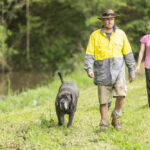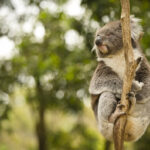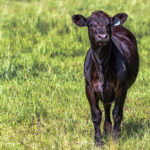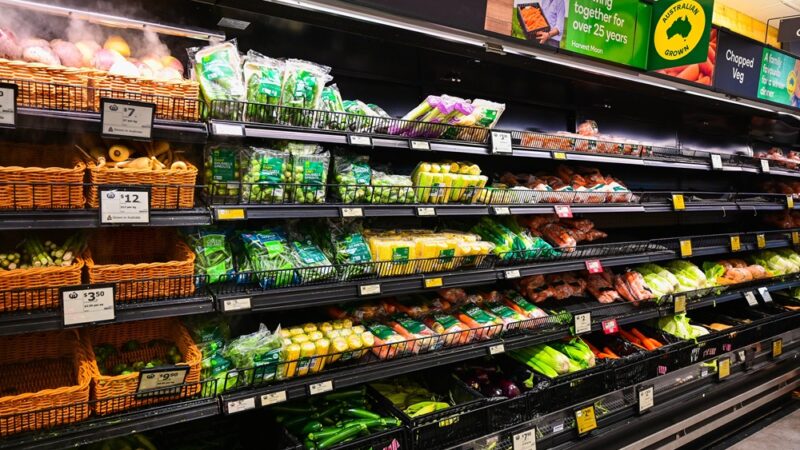Traditionally in Australia, the family farm has been passed on to the next generation. But…
An alpaca business and a fairytale lifestyle
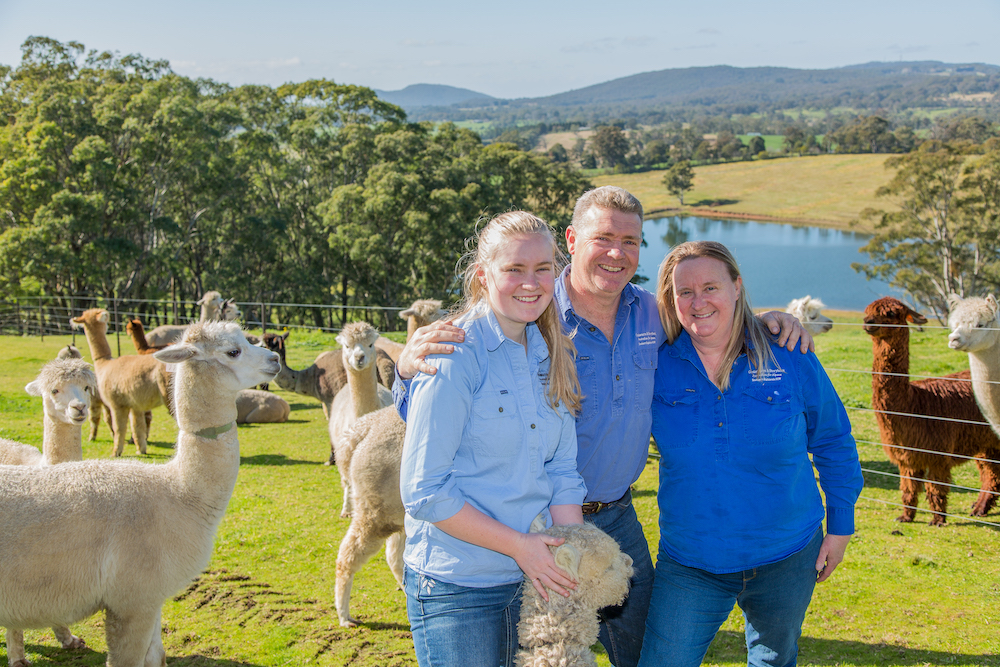
In 1998 Karen Williams started researching alpacas, thinking that an alpaca business could be something that she and her husband Mick could get into. She also often thought about owning her own caf�, as when she was a child she had her very own cubby house named Karen�s Caf� � where she served her friends and family tea and snacks.
�It was the quirkiness of alpacas that appealed to me, and their beautiful faces and eyes. I don�t think it was a lightbulb moment, but rather a gradual move towards something I have always loved,� Karen says.
Mick was sceptical at the time, as the industry had no foundation in Australia, and the fibre was worth nothing as there was no market for it. Up until the 1980s alpacas were only bred in their native homeland of South America.
Mick and Karen bought their first parcel of land � 30 acres in Bargo � and the building of a dream began when the couple who owned two alpacas on agistment on their land, decided to stay in Europe rather than return to Australia as planned. They told Mick and Karen to sell Ruba and La La, or keep them. As fate would have it, they kept the two creatures, bought another parcel of land in Pheasants Nest, and purchased their first breeding female that they named after their daughter Rubey�s kindergarten teacher � Mrs Herraman.
�That led to a lot of funny stories throughout Rubey�s time at school, especially during �Storytime�,� says Mick with a laugh. �We�d often talk about shearing Mrs Herraman or clipping her nails!�
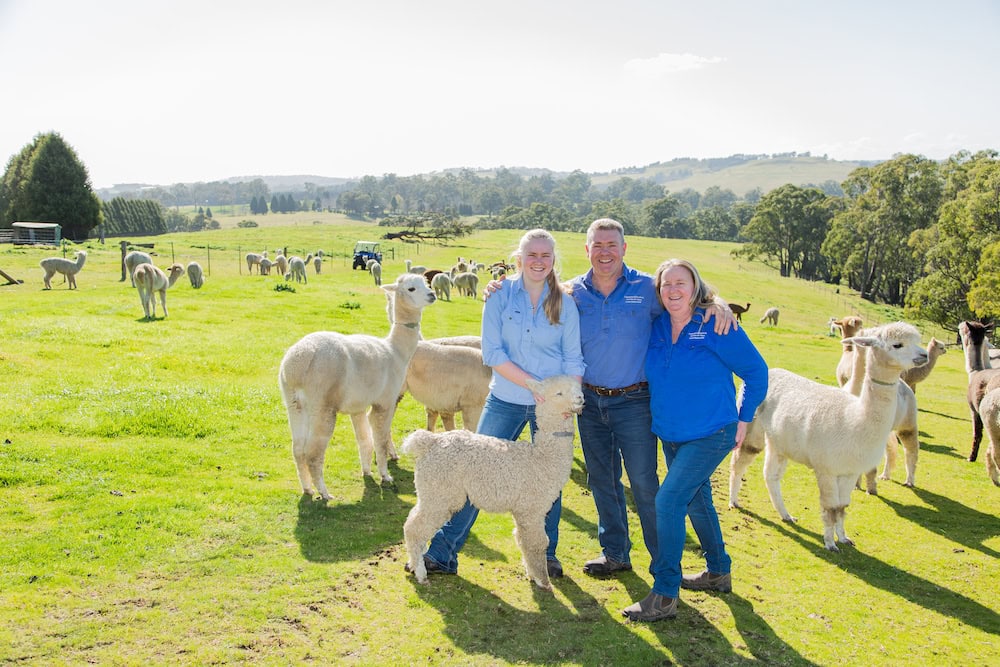
The day came when they had to name their business, and as both of them saw it as the beginning of a dream soon to become true, Storybook Alpacas became the name of one property, while the other was called Coolawarra � a blending of Coolaroo and Illawarra.
�It was quite literally the beginning of a fairytale,� says Karen. �Once upon a time is a catchphrase that has been used as the opening lines for storytelling since the 1380s. These stories end with �they all lived happily ever after��and Storybook Alpacas is such a tale.�
�We also all share a love and belief in the notion of Carpe Diem?�?aka seize the day?or?make your life extraordinary,� says Mick.
The building of an alpaca empire
During the development of the farm, another few arms of the business were launched � farm-stay accommodation, a caf� in Berrima called Courtyard Cafe, a livestock export company, and the family became a part of the Waratah Alpaca Fibre Co-operative, which has 50 alpaca members from across Australia, with the majority based in NSW.
Members of the collective realised that a group of them was far stronger than any one company, and this has paid off when it comes to selling and buying power. Over the past two years for instance, the co-op sold more than 70,000 kilos of alpaca fibre.
�Previously, that market didn�t exist � the fibre was just stuff sitting around on the floor,� says Mick. �Now we sell fibre domestically, and into New Zealand, China, and Italy. Before COVID-19 hit, we�d just sent samples to England, Istanbul, and India. That will pick up again I�m sure. China is one of the world leaders in textiles and as alpaca fibre is such a rare commodity, it is still in demand there,� says Mick.
The couple also own a martial arts studio called Just for Kicks Taekwondo, as in a former life Mick was a black-belted Taekwondo instructor. �That�s how we met,� says Karen with a laugh. I was a junior at the studio and he knocked me in the head while practising. He bought me flowers to apologise and the rest is history!�
The farm stay and the caf� grew out of Karen and Mick�s appreciation and passion for eco-tourism.
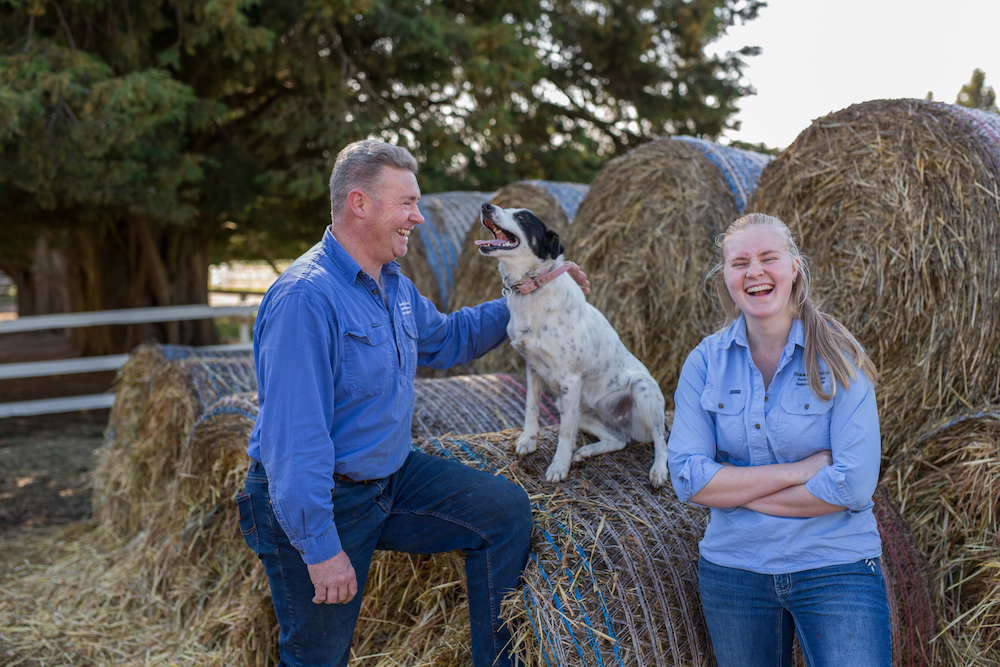
�The idea was that people would come and visit, pat an alpaca and enjoy a real working farm experience,� explains Karen.
�We were the first ones to start charging for this kind of experience in Australia,� adds Mick.
At first the couple weren�t charging for the visits, then decided to add a fee and see how it went. The crowds kept coming so they added to the experience � morning tea or afternoon tea and some alpaca education, and it became even more popular.
�I�d get home and there�d be 40 or more people on the property with Karen showing them around. Then we started getting enquiries from buses, and we realised that it was too much, both of us having corporate working lives, while we were also running our farm. It dawned on us that we could build our entire business and lives around our herd of alpacas.�
The caf� that Karen had always dreamed of opened two years ago, after the couple sold their ski chalet in Jindabyne in order to buy it. It�s now a buzzing eatery, and of course Karen brought alpacas to the party � adding things such as alpaca burgers, alpaca stroganoff and alpaca stew to the menu. There�s also alpaca meatball nachos, alpaca salads, and an alpaca salami and prosciutto served on a popular ploughman�s platter. The locals and tourists love the many offerings straight from the paddock to their plates.
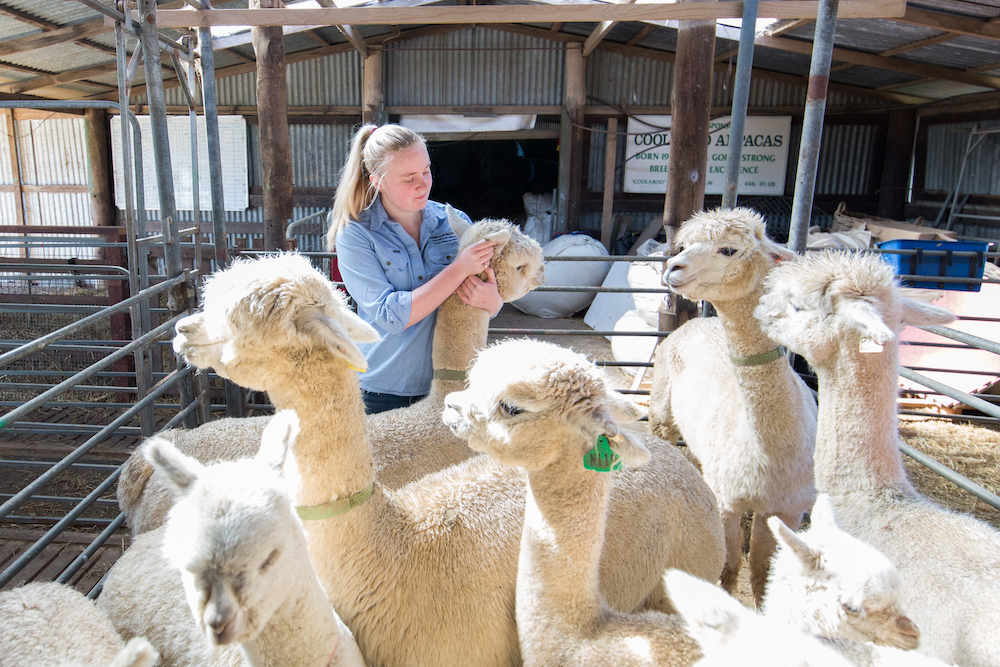
Mick and Rubey can often be found serving customers at their caf�, but it�s Karen�s main role alongside the popular farm stay operation, while Mick and Rubey run the farm and do most of the labouring and breeding work together.
�Rubey has been driving the tractor since she was eight, and from around the same age she�s been feeding and watering the animals,� Mick says with pride. �Over the past few years she�s really started to see the business potential in what we do.�
Rubey recently bought shares in her parent�s company and Mick and Karen hope to hand the baton over to her one day, so that she can continue to grow the business.
�She has skin in the game now,� explains Mick. �By buying into the herd she can also go to university and pay off her HECS debt. We are incredibly proud of her.�
Karen also looks forward to Rubey taking on more responsibility in the business, and knows that she�s not only smart and hardworking, but also savvy and kind. To top things off, Rubey is also the current National Champion for Young Alpaca Judging, and the Australian Alpaca Association�s youngest apprentice judge.
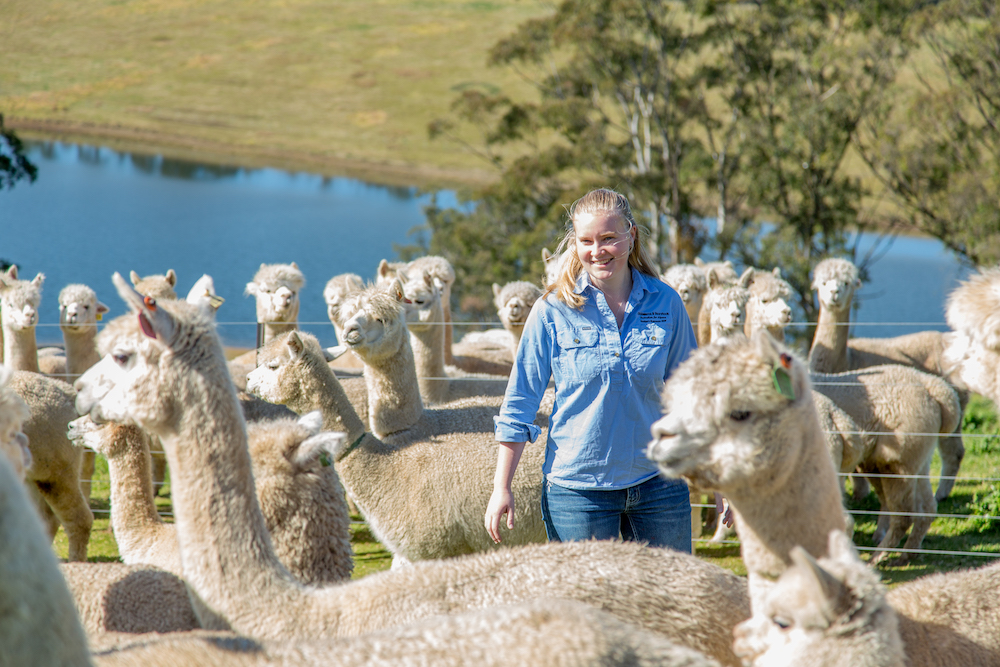
�She�s a good kid, our Rubey � we did a great job!� she says. �And our beautiful, four-legged animals have given us all some of the best experiences we could have ever asked or dreamed for, and that will continue under Rubey�s watch.�
Mick whole-heartedly agrees. �They have changed our lives for the better, and we are truly indebted to them. They�ve supported us � and given us such a unique lifestyle. We wouldn�t be where we are today without them.�
The new generation
Rubey Williams, now 20 years of age, went to Illawarra Grammar in Wollongong, and throughout school she was aware that she had a very different life to most of the kids around her.
�The bulk of my friends � they didn�t have the space I had, and I think that�s a good thing. I really appreciate our lifestyle,� Rubey says. �I would come home from school to a large property with a couple of dogs running around, and plenty of livestock wandering about. There was always something to do and always something to work on.
�I saved my pocket money when I was 12 to buy my first breeding female alpaca. By 16, I realised that farming was something I could do with my life � something I was good at and that I had a passion for. Then I started to take things seriously and realised that if I bought into the herd, I could pay off my HECS debt.�
Rubey recently started a Bachelor of Agricultural Business Management at Charles Sturt University, and she also works two days a week at Waratah Alpaca Cooperative in the sorting house � grouping, classing and pressing alpaca fibre. When it comes to being hardworking, her parents sure aren�t wrong � Rubey also works in the caf� most weekends.
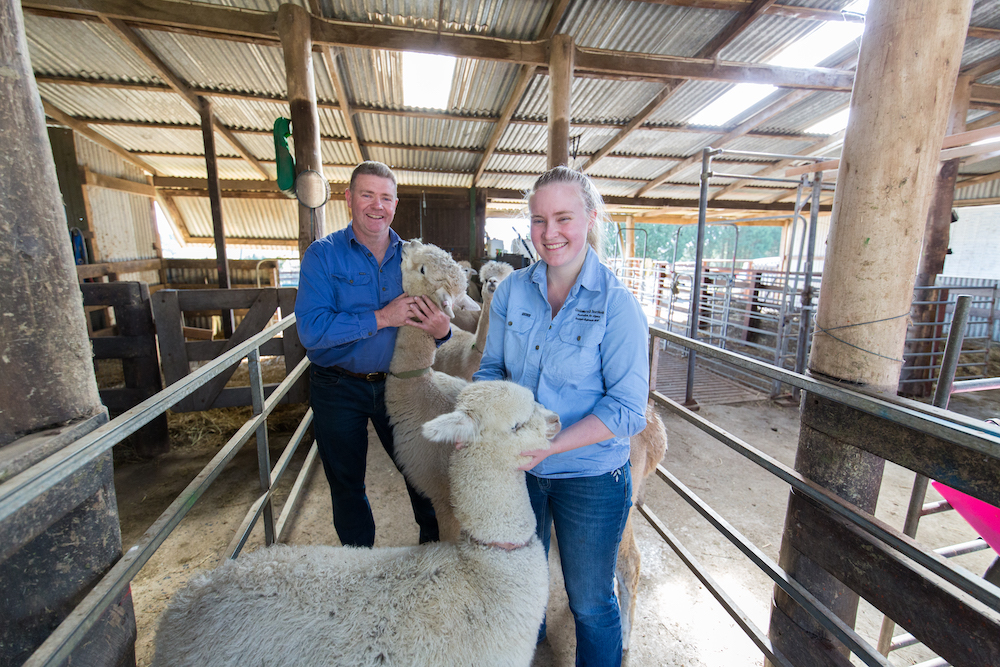
�Obviously I am chasing alpacas around 90 per cent of the time, so I am in no rush to finish my studies,� she says. �I should be finished my degree by the time I am 26 and I am happy with the lifestyle, the work, and not being overly stressed about my study.�
Rubey�s studies led her to doing some research on the alpaca industry in Western Australia, where she now has a long-term goal of the company�s expansion.
�I had to do a unit of study on establishing and running an alpaca enterprise and it got me really excited,� she says. �It would be an enterprise a lot bigger than what we are doing here � ten times the size actually, with around 10,000 alpacas.�
For now, the next expansion on the horizon is coming up soon, and Rubey can�t wait to get stuck into it with her parents. The trio have ordered 17 Babydoll sheep from across the country for breeding, pigmy goats for their meat, and will also expand their live export market in Speckle Park cattle.
�The Babydoll sheep arrive during January, and I am so excited! They�re three-month-old weaners when they arrive, and we have breeding ewes and two rams from South Australia,� Rubey says. �They�re hard to come by so we had to buy them from all over the country, but we can start breeding early and they are only pregnant for six months, so we�ll have new lambs in the spring.
�You can sell them off for an amazing price as they have great fibre,� Rubey says. �They are hot on the export market right now too.�
This continual education on new products, planning and business organisation comes from sharing their own knowledge and learning together, and so company meetings are a structured affair.
�Dad chairs them, and he�ll ask mum and I to put our ideas, plans and what we are working on forward, beforehand. Mum focusses more on the farm-stay and the caf�, and dad and I on the farm, but we all need to be across what everyone else is doing, and understand all parts of the business,� Rubey says. �It�s really important to know what�s going on for everyone.�
In the meetings, everything from animal movements and joinings, shearing, caf�, co-op and business logistics are covered.
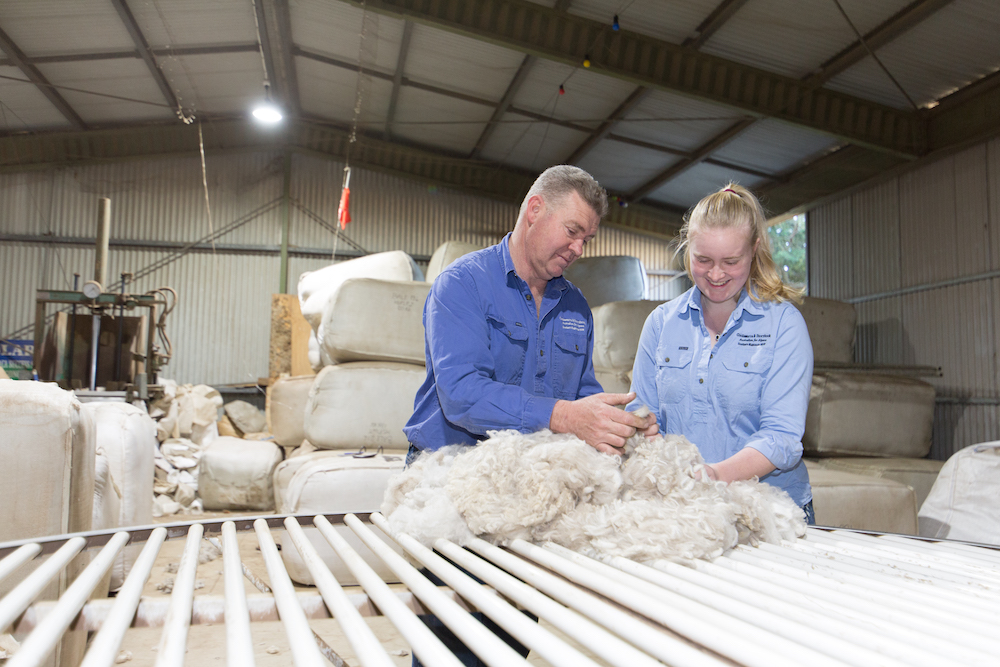
�We always have to get through a lot. Dad and I need to work through things such as which mobs we�ll shear first � managing the herds so we don�t mix them, things like that. It�s a rigmarole and I am always glad when shearing is finished,� Rubey says. �There�s a lot of staff to manage too, from those in the caf�, to shearers and everyone else.�
First and foremost, Rubey stresses that the aim of the game is achieving the best possible fibre from their alpacas. �We are getting closer and closer to the quality of Merino, but that industry has had more than 200 years to fine-tune its fibre, and we�ve only had about 30! Slowly, slowly, we will get there,� she says.
As anyone who has done it knows, it takes a certain kind of family to work and live together, but between Mick, Karen and Rubey, they have all bases covered for the many prongs of their enterprise, and Rubey�s maturity and independence are traits that have obviously been encouraged from a young age.
�Dad and I work together on all aspects of the farm, and I see it more as a partnership rather than one of us working for the other,� she says. �I am mainly a labourer around the farm, a stud manager really, but we make all of the decisions together.�
Rubey adds that she is not going lie � it can be hard working with your family and it�s not always a well-oiled machine.
�All three of us are so passionate about what we do, and that means there are going to be clashes. But that same level of passion also complements us so well when we work together and when decisions need to be made. I really wouldn�t want to work with anyone else.�

If you enjoyed this story about a family business, you might enjoy our feature on a farming couple who bake for a living.


